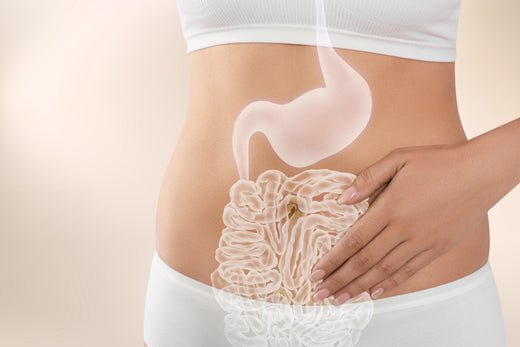Gut health is all the rage these days, and for good reason! Our digestive system plays a major role in our immune defense, overall health and wellbeing. An unhealthy gut can lead to issues like inflammation, autoimmune disease, mental health problems, and a lot more. That's where probiotics come in.
Probiotics are live microorganisms that help repopulate your gut with good bacteria to crowd out the bad bacteria and yeasts. This improves digestion, boosts immunity, and provides many other benefits. But when's the best time to take them so you can maximize their perks?
When is the Best Time to Take Probiotics?
There’s no scientific evidence that shows the best time to take probiotics. So the best time to take probiotics is actually when it’s convenient for you to do it, so you can keep a regular schedule.
Whether you take probiotics in the morning, lunchtime or evening, there are a few things you should consider:
- The largest colonies of our good gut bacteria are concentrated in the lower GI tract, so the probiotics need to survive the stomach acid and reach the large intestine in order to have the highest impact.
- When you take probiotics with meals, the highly acidic environment inside the stomach gets activated to break down food, which can also damage the beneficial bacteria in the probiotics, keeping them from reaching your lower GI tract.
- That means taking your probiotic supplement first thing in the morning or about 30 minutes before a meal is ideal. This allows the probiotics to reach the intestines before food starts the digestion process. Taking your probiotics at bedtime can also help.
- Some people find that probiotics cause mild side effects like gas or bloating. If that's the case for you, take your probiotic with a meal. The food will help buffer the probiotics and minimize any digestive discomfort.
- Consistency matters more than the exact time. Don't stress too much about taking probiotics at the perfect time. The most important thing is to take them regularly, ideally at the same time each day. This helps build a stable colony of good bacteria.
The bottom line: Aim to take probiotics on an empty stomach. But if that causes problems, take them with a meal. And be sure to take them consistently every day.
Maximizing the Benefits of Probiotics
How do you get the most out of your probiotics?
First, be sure to feed your probiotics prebiotics. Prebiotics are fibers that act as food for the good bacteria in probiotics. Some great prebiotic sources include bananas, onions, garlic, leeks and asparagus. Getting plenty of prebiotics in your diet gives your probiotic bacteria the fuel they need to thrive. When choosing a probiotic supplement, make sure that it also includes prebiotics for better results.
You'll know your probiotics are working when your poop becomes more frequent, you have less bloating and gas, and maybe even better mood. If you don't notice positive changes within a few weeks of starting probiotics, you may need to adjust the type or dose. Everyone's microbiome is unique.
It's also important to avoid unnecessary antibiotics when possible, since these drugs kill off good bacteria along with the bad. Always finish your full course of antibiotics if prescribed, but try to minimize use by seeking alternative treatments for minor infections that may not require antibiotics. Lifestyle factors like stress, poor diet and lack of sleep can also impact probiotic bacteria levels.
Probiotic Supplements vs. Fermented Foods
You can get probiotics through both supplements and fermented foods that contain live cultures.
Probiotic supplements are convenient, consistent, and allow you to get higher amounts of specific strains than food alone. High-quality supplements will clearly state the genus, species and strain of probiotics, as well as CFU count. Some of the most researched probiotic strains are Lactobacillus acidophilus, Bifidobacterium lactis and Saccharomyces boulardii. Supplements make it easy to get good amounts of these beneficial microbes.
Fermented foods that contain live cultures include yogurt, kefir, sauerkraut, kimchi, kombucha, miso, tempeh and some aged cheeses. The pros of getting probiotics from foods are that they provide complementary nutrients and compounds that may enhance the benefits of the probiotics. Fermented foods also contain a diverse community of microbes. The downside is that foods vary in amounts and strains of probiotics. Yogurt can range from 1 million to 10 billion CFUs per serving. Kefir tends to be higher in probiotics than yogurt. Sauerkraut, kimchi and other fermented veggies get their probiotics from lactic acid bacteria during the fermentation process. Try incorporating a variety of cultured and fermented foods into your diet to get a diversity of beneficial microbes.
How to choose a Probiotic Supplement
When selecting a probiotic supplement, here's what to look for:
-
CFUs (Colony Forming Units)
CFUs indicate the number of live and active bacteria cultures in a probiotic. Look for a supplement with at least 1-10 billion CFUs to get real benefits. Some probiotics may have up to 100 billion CFUs, but more does not necessarily mean better. Start low and increase if you need to.
-
Strain Diversity
Choose a probiotic with multiple strains of bacteria. Different strains have different benefits, so variety is key. Lactobacillus and Bifidobacterium are common probiotic strains to look for. Aim for at least 3-10 strains in your supplement.
-
No Refrigeration Needed
Probiotics are living microorganisms that can die off without proper storage. Many probiotic supplements require refrigeration to maintain potency. However, some use time-release technologies that allow shelf-stable storage without compromising their effectiveness. Look for "no refrigeration needed" on the label.
The bottom line is to choose a probiotic with ample CFUs, diverse strains, and convenient shelf-stable delivery.
How long does it take for probiotics to start working?
Many people notice benefits from probiotics within 1-2 weeks, but some studies show that it can take up to 6 weeks. Give it at least a month before deciding if your probiotics supplement is working well for you.
Are there any side effects from taking probiotics?
Probiotics are generally very safe, even in high doses. Mild gas or bloating when first starting probiotics is common and usually goes away within a few days. More serious side effects are very rare in healthy people. Those with compromised immune systems should consult their healthcare provider before taking probiotics supplements.
![]()
BEST supplements are formulated with the most effective, science-backed ingredients out there, and nothing else. No fillers, no false promises, and no B.S.
Just the right doses, delivered the right way, with results that actually matter.
Because your BEST health starts with the BEST standards. And we’re here to deliver both.
*These statements have not been evaluated by the Food and Drug Administration. This product is not intended to diagnose, treat, cure, or prevent any disease.









